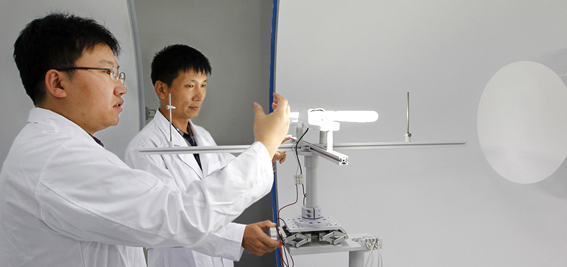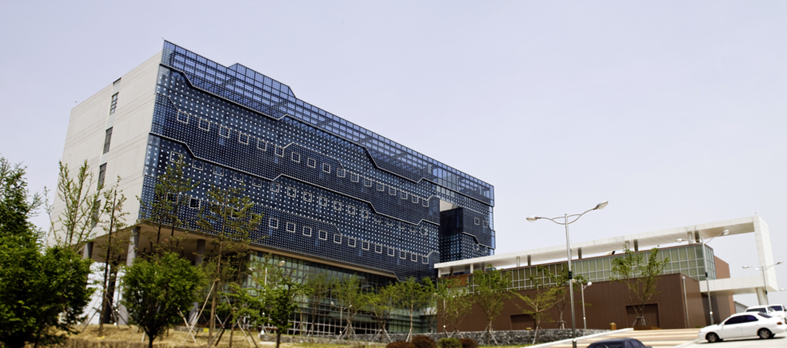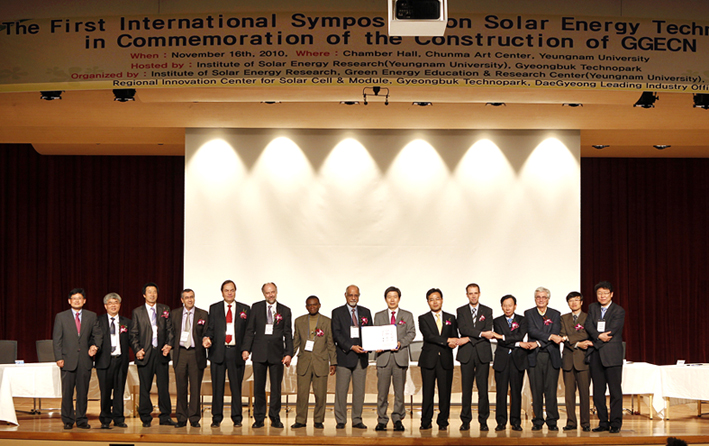“YU to Lead Government Green Energy Roadmap!” N
No.88429- Writer YU
- Date : 2012.01.03 09:54
- Views : 11082
Ranked first in Korea in evaluation for leadership
and expertise fostering for the \'Green Energy R&D\' with national funding worth 100 billion won
[June 7, 2011]
The government announced the \'Green Energy Strategy Roadmap 2011\' for fostering green energy on the 7th. They announced mid and long-term R&D guidelines in 15 main sectors in order to secure the future green energy market.
A total of 26 trillion won will be invested to 2030 in 15 main green energy sectors including solar power, fuel cells, wind energy, green cars, and smart grids. The government\'s goal through this roadmap is to increase the current share of the global green energy market of 1.2% to 18% by 2030. In addition, it is planning to create 1.5 million new jobs. It is thus expected that the industry related to domestic green energy R&D will become busier and the demand for experts on green energy will also grow drastically.
At such point, Yeungnam University (president Lee, Hyo-soo) is rising as a hub of South Korea for \'fostering experts and R&D in green energy\'. YU\'s \'Green\' specialization is finally coming into the limelight in research, education and globalization.

Researchers of the LED-IT Fusion Technology Research Center are operating the integrating sphere.
First, in the R&D sector, YU is pursuing green research amounting to 100 billion won in national funding. Results of industry-academic cooperative research with companies in the green energy sector such as solar cells and green cars are scheduled to launch multi-purpose electric vehicles priced in the 2 million won range later this year, and likewise, it is reaping great achievements in green energy R&D and commercialization.
Green research of YU are being carried out on three main points. ▲ development of energy conservation technologies in existing industry sectors (LED-IT fusion Technology Research Center, green car parts project team) ▲ development and commercialization of new green energy technologies (solar cell RIC, Institute of Solar Energy, TUV Rheinland test center, ISET solar cell Korea mass production line) ▲ and diffusion of energy-conserving culture (small & medium business HRD Agency).
In addition, the CRC (Convergence Research Center) was established in campus and the building that was first completed is being used as a center for \'green research\'. This is because due to the characteristic that new high technologies must be discovered, with fusion and integration among related majors and organizations.
Through this, it is hoping that its \'Global Frontier 10-3-10\' goal to be in the world\'s top 10 in the 3 major fusion and integration research areas within the years will accelerate the green sector (GIFT Plan).

The first building constructed in the YU CRC is where the green energy R&D and industry-academic cooperation-oriented research centers are gathered.
YU stands out in \'green education\' as well. Recently, the YU Green Energy Education & Research Center placed first among the 21 centers nationwide in the Ministry of Education, Science and Technology\'s (MEST) annual evaluation. Thus, YU was officially recognized as the best green education institute for two straight years. Just as last year, it will be receiving support from the national treasury as incentives.
This center, which is fostering green experts with funding from the national government totalling 25 billion won for five years from 2009, is being participated by 92 professors and 1,403 students from four undergraduate organizations such as School of Chemical Engineering, School of Materials Science and Engineering, Major of Mechanical Advanced Engineering in School of Mechanical Engineering, and Department of Physics in the College of Sciences. In particular, an education system for majors in connection with the \'Major of Green Energy\' was constructed and programs for the three tracks of solar cells, hydrogen fuel cells, and energy systems are operated. At this evaluation, the excellence of the education system was officially recognized. Furthermore, it received top points for \'cooperation with companies and corporate support activities\' and \'activities in link with support for employment\' and it received high scores for industry-academic cooperation such as scoring max points in the index for the satisfaction and independence of participating students and businesses. In addition, the internship program for 30 graduates students who did not get jobs resulted in 23 of them being hired full time.
On this, Lee, Hyo-soo, president of YU stated, \"YU killed two birds with one stone of research and education through its \'green specialization\' in just two years,\" and added with emphasis, \"YU will lead green research and green education that cooperates and competes with the world as the Korean hub of \'green innovation\'.
Construction of GGECN, leading global cooperation through specialization of \'green energy\'
Meanwhile, last November, YU constructed the GGECN (Global Green Energy Cluster Network), opening the \'global cooperate age\' in the green energy sector. Founding members are Korea\'s Yeungnam University, which is playing a key role, Province of Gyeongsangbuk-Do, Gyeongbuk Techno Park, Daegyeon Leading Industry Support Group, Daegyeong Regional Energy Climate Change Center, and ISET (International Solar Electric Technology), and US\'s FESC (Florida Energy Systems Consortium), the world\'s largest single consortium on green energy, Georgia Institute of Technology, and CRSP (Center for Revolutionary Photoconversion), a consortium based in Colorada. Also, University of Strasbourg of France, Germany\'s TUV Rheinland, and Australia\'s University of New South Wales also participated.

Last November, world-glass green energy research clusters met at YU and agreed upon constructing a network for global green cooperation
Attracting world-class green energy research institutes and corporations.
Earlier in August of last year, the \'TUV Rheinland\' test center, one of the most prominent international certification evaluation institutes for solar power modules was constructed within the campus, being the 7th in the world, and is planning to conduct certification evaluation tests from August of this year. For this, 900 million won in national funds and 2.1 billion in provincial funds for a total of 3.5 billion won will be invested in equipment and constructing systems for two years.
And in February, 50 million dollars in investments for the solar cell mass production line was won from ISET (International Solar Electric Technology), which is a US company specializing in solar cells. In accordance with the direct investment plans in Korea by ISET, the YU solar cell/module RIC and Institute of Solar Energy, solar cell material process human resource fostering team, etc will participate jointly in the construction of ISET\'s low-cost, high efficiency CIGS thin film solar cell mass production line, and it is cooperating with YU for industry-academic research and R&D personnel employment.